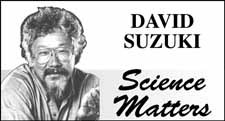We've come through the first decade of the 21st century, and it seemed appropriate to revisit a chapter marking the new millennium in my book, The Sacred Balance (Greystone Books/DSF, 1997). The following is from the final chapter.
Humanity is an infant species, newly evolved from life's web. And what a magnificent species we are; we can look out and feel spiritually uplifted by the beauty of a forested valley or an ice-coated Arctic mountain, we are overwhelmed with awe at the sight of the star-filled heavens, and we are filled with reverence when we enter a sacred place. In the beauty, mystery and wonder that our brain perceives and expresses, we add a special gift to the planet.
But our brash exuberance over our incredible inventiveness and productivity in this century has made us forget where we belong. If we are to balance and direct our remarkable technological muscle power, we need to regain some ancient virtues: the humility to acknowledge how much we have yet to learn, the respect that will allow us to protect and restore nature, and the love that can lift our eyes to distant horizons, far beyond the next election, paycheque or stock dividend. Above all we need to reclaim our faith in ourselves as creatures of the Earth, living in harmony with all other forms of life.
The ebb and flow of organisms - fish, birds, mammals, forests - across the Earth's expanses reflect built-in territorial rhythms that are worthy of respect.
When we acknowledge our dependence on the same biophysical factors that support all other life-forms, believing that we have the responsibility for "managing" all of it becomes a terrible burden. But if we look at the world through the lenses of all of life together, we may recognize the origins of our destructive path and realize that we are not the "managers"; there is wisdom enough for self-management in the web of living creatures that has survived for more than 3.6 billion years. Instead of trying and failing to manage the life-support systems of the planet, we - each one of us - can manage the effect we have on those systems.
Knowing how to act is the first big problem. Many people who are eager to work towards personal and public change feel increasingly baffled by the often contradictory messages from experts, as well as the mantras repeated over and over by the media. We no longer trust our innate common sense or the wisdom of our elders.
At this critical juncture in our history on Earth, we are asking the wrong questions. Instead of "How do we reduce the deficit?" or "How do we carve out a niche in the global economy?" we should be asking "What is an economy for?" and "How much is enough?" What are the things in life that provide joy and happiness, peace of mind and satisfaction? Does the plethora of goods that our high-production economy delivers so effectively provide the route to happiness and satisfaction, or do the relationships between human and nonhuman beings still form the core of the important things in life? Is the uniformity of food and other products that we now encounter everywhere on the globe an adequate substitute for the different and unexpected?
We seem to have forgotten the real things that matter and must establish the real bottom line of non-negotiable needs in order to regain a balance with our surroundings.




